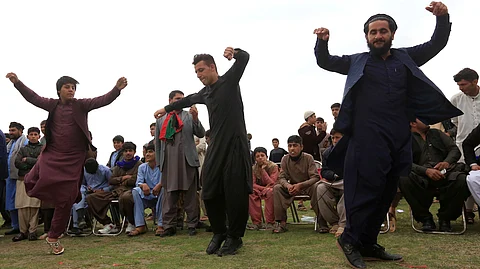
- Home
- About
- Globally Speaking
- Videos
- Podcast
- Geopolitics
- Industry
- SIGN UP

Renewed internal violence, coupled with the withdrawal of US and Nato forces, has forced New Delhi to examine a new questionnaire with regard to its long-term policies on Afghanistan.
The advent of the Eid holidays may have influenced the Taliban in Afghanistan to announce a three-day ceasefire in hostilities but the cold, hard reality is that violence will accelerate after this short break.
The ceasefire was preceded by an upsurge in fighting and the bombing of a girl’s school – total casualties have been reported, thus far, at around 85 with over 150 injured.
Quite naturally, the attack has raised concerns of a rapidly deteriorating security situation in Afghanistan as US President Joe Biden’s commitment to remove US forces before September 11 draws near.
The obvious choice from here onwards would be to ensure that the Afghan administration and the Taliban find a path to forge peace and reconciliation and the reconstruction of the country.
The changing dynamics in Afghanistan will no doubt be forcing New Delhi to assess the ground realities that exist in Kabul. India has invested far too much of time, resources and energy to prop up Afghan government and support the fragile platforms of Afghan society and its people.
There is now a genuine concern that the country would be overtaken by the Taliban in a matter of 2-3 years following the withdrawal of foreign forces and a more hard-line government will once again be back at the helm in Kabul. Too many age-old, unsolved, geo-political equations will once again come back to the fore and India, principally, will be forced to reassess its priorities in Afghanistan – this time against the paucity of time and proper support of its international allies who will have vacated the theatre by then. An unending cycle of violence will have a spill over effect across many borders that surround Afghanistan.
Key to such developments will be the political, security and economic threat that could be imposed upon India given that it has for decades supported elected Afghan governments while maintaining a distance from the Taliban. India’s support of successive governments has been steadfast since the 2001 Bonn conference, following the collapse of the Taliban regime till present. The time for New Delhi to reorient its policies towards Kabul and the Taliban is drawing near.
There are subtle indications that New Delhi may be considering dialogue with the Taliban. It is believed that Washington desires India to take a more active role in the Afghan peace process and this could mean more discourse with the Taliban in future. Indian foreign minister Dr. S Jaishankar’s comment that his country would support “Afghan-led, Afghan-owned and Afghan-controlled” peace process was not lost on anyone. At the same time, India had issued a joint EU-India statement, on May 4, that it would not support a Taliban government in Kabul.
India’s concerns for the political future of Afghanistan are genuine. The road ahead is long, hard and full of attrition. Should the opportunity arise for a power-sharing arrangement in Kabul then it would force India to re-examine its political and diplomatic engagements with Afghanistan in future. It will ensure that New Delhi will be forced to do some heavy lifting given the presence of third parties who have their own interests in ensuring that peace and stability is always in a state of flux.
According to Reuters, General Bipin Rawat, Chief of Defence Staff of India, told a security conference last month, that the worry was "disruptors" would step into the space created by the withdrawal of foreign troops from Afghanistan. He declined to name the countries that could act as spoilers. "Our concern is that the vacuum that will be created by the withdrawal of the United States and NATO should not create space for disruptors. There are many people looking for an opportunity to walk into the space being created".